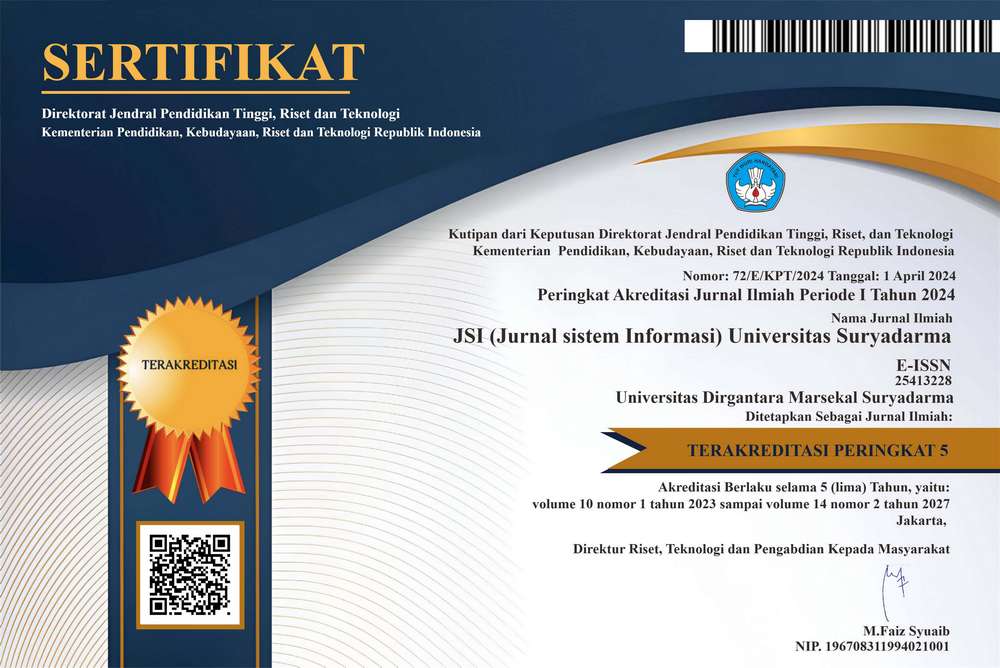PEMANFAATAN KECERDASAN BUATAN PADA ALGORITMA K-MEANS KLASTERING DAN SENTIMENT ANALYSIS TERHADAP STRATEGI PROMOSI YANG SUKSES UNTUK PENERIMAAN MAHASISWA BARU
DOI:
https://doi.org/10.35968/jsi.v11i1.1120Abstract
Promosi merupakan salah satu komponen dalam memberikan informasi yang benar terhadap masyarakat atau calon mahasiswa baru, baik mengenai biaya, detil jurusan, akreditasi, kurikulum, dan profil lulusan. Perguruan tinggi saat ini berhadapan dengan persaingan yang semakin ketat dalam merekrut mahasiswa baru. Ketepatan dalam mengatur strategi dalam promosi menjadi kunci utama terhadap peminatan calon mahasiswa. Dalam kaitannya, kecerdasan buatan pada algoritma klastering K-Means dapat menjadi alat yang berharga untuk mengidentifikasi strategi promosi yang lebih efektif dan analisis sentiment untuk mengukur pandangan dan reaksi calon mahasiswa terhadap promosi yang dilakukan sebelumnya. Dengan menggabungkan hasil pengelompokan Algorimta K-Means dan analis sentimen diharapkan dapat meningkatkan jumlah penerimaan mahasiswa baru yang signifikan mencapai 90%. Kata Kunci: K-Means, Kecerdasan Buatan, Strategi PromosiReferences
Balaji, K. (2022). Machine learning algorithm for feature space clustering of mixed data with missing information based on molecule similarity. Journal of Biomedical Informatics, 125(May 2021), 103954. https://doi.org/10.1016/j.jbi.2021.103954
Dwivedi, Y. K., Hughes, L., Ismagilova, E., Aarts, G., Coombs, C., Crick, T., … Williams, M. D. (2021). Artificial Intelligence (AI): Multidisciplinary perspectives on emerging challenges, opportunities, and agenda for research, practice and policy. International Journal of Information Management, 57(July), 0–1. https://doi.org/10.1016/j.ijinfomgt.2019.08.002
Dwivedi, Y. K., Ismagilova, E., Hughes, D. L., Carlson, J., Filieri, R., Jacobson, J., … Wang, Y. (2021). Setting the future of digital and social media marketing research: Perspectives and research propositions. International Journal of Information Management, 59(July 2020), 102168. https://doi.org/10.1016/j.ijinfomgt.2020.102168
Dwivedi, Y. K., Kshetri, N., Hughes, L., Slade, E. L., Jeyaraj, A., Kar, A. K., … Wright, R. (2023). “So what if ChatGPT wrote it?†Multidisciplinary perspectives on opportunities, challenges and implications of generative conversational AI for research, practice and policy. International Journal of Information Management, 71(March). https://doi.org/10.1016/j.ijinfomgt.2023.102642
Fan, H. (2023). Research on innovation and application of 5G using artificial intelligence-based image and speech recognition technologies. Journal of King Saud University - Science, 35(4), 102626. https://doi.org/10.1016/j.jksus.2023.102626
Awaludin, M. (2017). Penerapan Metode Inferensi Terhadap Penelusuran Silsilah Keluarga Berdasarkan Golongan Darah & Hla. Jurnal CKI On SPOT, 10(1).
Awaludin, M., & Yolanda, N. E. (2018). Analysis of CEISA Services User Satisfaction Using the EUCS Method in The Directorate General of Customs and Excise. Conference SENATIK STT Adisutjipto Yogyakarta, 4. https://doi.org/10.28989/senatik.v4i0.274
Nguyen, H. H., Ngo, V. M., Le, T. T. P., & Nguyen, P. Van. (2023). Do investors’ personalities predict market winners? Experimental setting and machine learning analysis. Heliyon, 9(4), e15273. https://doi.org/10.1016/j.heliyon.2023.e15273
Patel, H., Kansara, A., Prathap, B. R., & Pradeep Kumar, K. (2023). Human behavior analysis on political retweets using machine learning algorithms. Measurement: Sensors, 27(January), 100768. https://doi.org/10.1016/j.measen.2023.100768
Raphael, J., Madhusudana Rao, N., Bindu, A., & Gao, X.-Z. (2022). Clustering-based Factorization Machines for Advertisement Click prediction. Procedia Computer Science, 215, 546–555. https://doi.org/10.1016/j.procs.2022.12.057
Shi, H., Peng, Q., Xie, Z., & Wang, J. (2023). A semi-supervised hierarchical ensemble clustering framework based on a novel similarity metric and stratified feature sampling. Journal of King Saud University - Computer and Information Sciences, 35(8), 101687. https://doi.org/10.1016/j.jksuci.2023.101687
Sroginis, A., Fildes, R., & Kourentzes, N. (2023). Use of contextual and model-based information in adjusting promotional forecasts. European Journal of Operational Research, 307(3), 1177–1191. https://doi.org/10.1016/j.ejor.2022.10.005
Ybañez, A., Ancheta, R., Evangelista, S. S., Aro, J. L., Maturan, F., Atibing, N. M., … Ocampo, L. (2023). How can we use machine learning for characterizing organizational identification - a study using clustering with picture fuzzy datasets. International Journal of Information Management Data Insights, 3(1). https://doi.org/10.1016/j.jjimei.2023.100157












